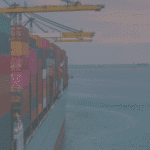Here’s my beef!
An F&L The European Freight and Logistics Leaders’ Forum series of short personal comments on the global freight logistics market
Michael Blumentsev, October 14, 2025
The hardest test in procurement – and the one few get right
 If procurement were a sport, logistics sourcing would be the decathlon.
If procurement were a sport, logistics sourcing would be the decathlon.
Every company depends on logistics – but few truly master it.
Too many still see it as execution, not strategy.
In my latest newsletter, I share what separates teams that simply move goods from those that move the business forward.
After more than 20 years working with global supply chains, one truth stands out:
logistics sourcing isn’t just another procurement category – it is the most complex, dynamic, and business-critical area in the field.
And yet, even in global organizations, logistics sourcing rarely receives the attention or investment it deserves.
Logistics: a category apart
Logistics doesn’t fit neatly into the usual “direct” or “indirect” spend boxes.
It is a service – but unlike most services, it can’t be paused, deferred, or replaced to hit short-term savings.
Distinct from standardized categories, logistics is shaped by thousands of moving parts: fluctuating fuel costs, labor shortages, compliance regulations, geopolitical disruptions, and the constant need to balance cost with capacity and service.
It is the bloodstream of the supply chain – moving raw materials to factories and finished goods to consumers.
When logistics interrupts, business stops.
Yet many organizations still view logistics through a direct vs. indirect lens – instead of recognizing it as a specialty category that demands dedicated expertise and operational depth.
Too frequently, logistics sourcing is led by capable procurement professionals who lack hands-on logistics experience – generalists rather than true logistics specialists.
That is where value leaks.
Treating logistics as a commodity or a transactional spend limits strategic impact and leaves organizations exposed when market conditions shift.
Mastery requires real operational knowledge
To elevate logistics sourcing to a true competitive advantage, the professionals leading it must understand logistics operations as deeply as – or even more than – their logistics operations counterparts or their incumbent providers.
Only with this level of fluency and operational depth can logistics sourcing challenge the status quo, design innovative supplier strategies, and deliver value far beyond cost – securing capacity, service reliability, and business continuity.
Without it, logistics sourcing risks becoming a “middleman” function – trapped between logistics operations and incumbent suppliers, reactive instead of strategic, and unable to drive lasting improvement.
When managed right, logistics sourcing creates competitive advantage
Experience shows that the best logistics sourcing teams don’t just negotiate – they understand warehousing, trucking, ocean, and air freight with the depth of a logistics provider — and think like strategists.
Those who master both sides – sourcing and operations – make logistics sourcing a true enabler, not a middleman lost in transactions.
When managed right – with the proper expertise, technology, and collaboration (internally and externally) – logistics sourcing transforms from a cost-driven function into an engine of competitive advantage that secures capacity, safeguards service and drives resilience.
Handled this way, it goes far beyond rate negotiations.
It defines the organization’s competitive edge – balancing cost, agility, and continuity even when markets turn volatile.
Proven in practice
This isn’t theory.
It’s what I have lived – building and leading teams that turned logistics sourcing into a true competitive weapon across multiple diverse industries.
The following are just a glimpse of my career highlights proving the point:
At Mondelez, I led a 40+ strong team and $1B+ spend through a transformation that delivered $29M above target in 2024 alone – the highest in company history – and repositioned logistics sourcing as a global benchmark recognized by Kearney.
At PepsiCo, I built and led a global cross-functional team to secure continuity of supply and offset 93% of ocean freight inflation amid the COVID-era disruption – one of the toughest periods in maritime history.
At Amcor, I transformed logistics end-to-end through the deployment of a 4PL Control Tower across 50+ plants, a sourcing overhaul, and full Source-to-Pay digitalization – delivering 19% annual savings and 98%+ on-time delivery.
Across every transformation, the real differentiator has been people with deep expertise, the courage to challenge the status quo, and the drive to see execution through – not until it starts, but until it delivers.
And nowhere is that truer than in logistics sourcing.
The Unsung Heroes: world-class logistics procurement professionals
Those who excel in logistics procurement are among the strongest experts in the profession.
Their unique skill set – grounded in both operational and sourcing excellence – makes them capable of leading any spend category, direct or indirect.
They adapt quickly, solve high-stakes challenges, and create value in ways recognized across the enterprise.
Conclusion
Logistics sourcing stands alone as both the most complex and the most valuable procurement category.
Recognize it as such, equip it with deep operational know-how, modern tools, and empowered collaboration – and supply chain resilience and business success will follow.
Behind every world-class supply chain is a world-class logistics sourcing capability – powered by experts leading it.
What is one practice or capability that’s helped your logistics sourcing create real strategic value – and how did you make it happen?






